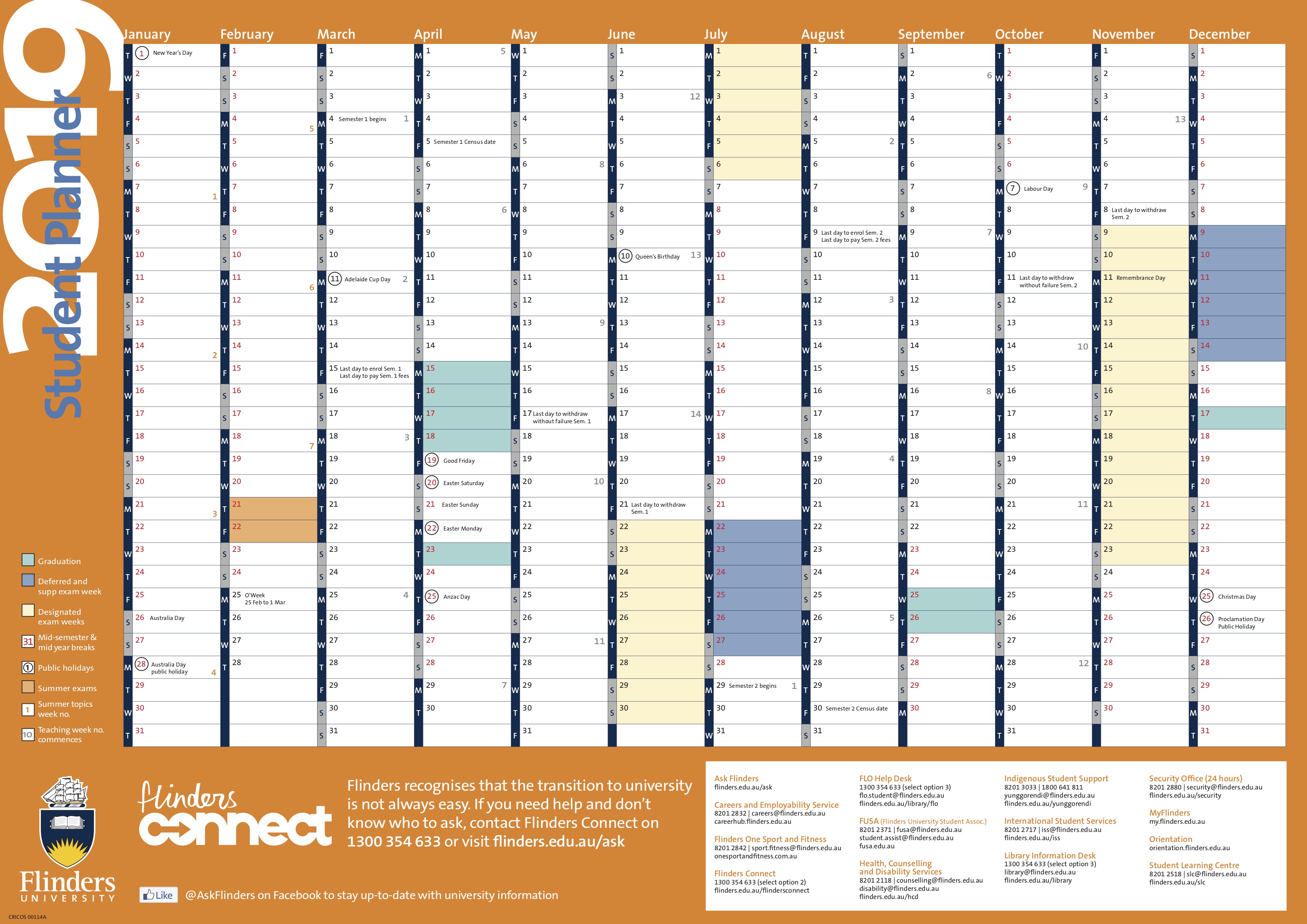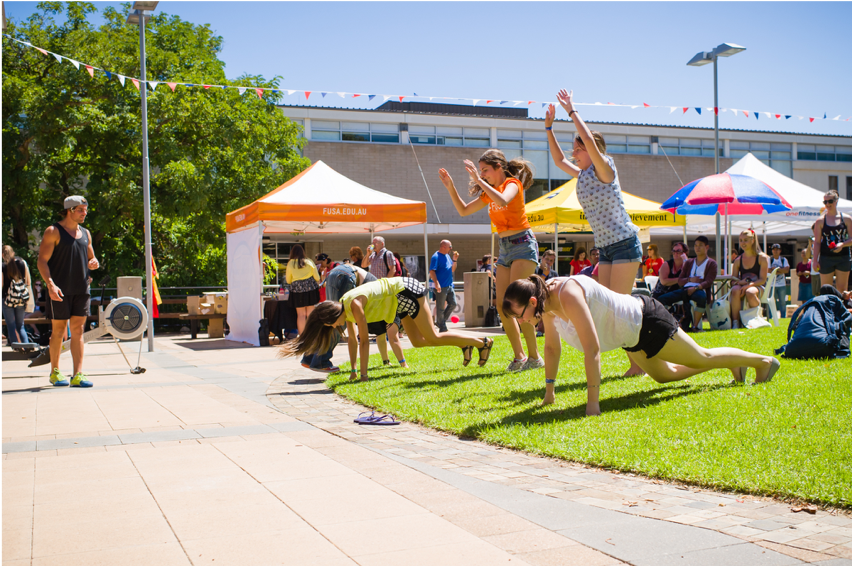
What is a good student?
Being a good student encompasses lots of different things. Mostly, it’s about approaching university in a holistic way, which means taking into account all of the different elements of university life: your study and academic skills, your mental health and physical wellbeing, your social connections and relationships, and your home life and work responsibilities.
A good student recognises that their studies are just one aspect of a much more complicated life, but there are definitely some techniques and strategies that you can employ to make sure that the university and study part of your life is off on the right foot!
Strategy #1: Get to know the campus.
In case you haven’t realised it yet, Flinders is big! I recommend taking a tour in O-week to familiarise yourself with what’s here. Walk around the lake, the library (there’s more than one level!), figure out how car-parking works, where the health and counselling and student services are. Then have a look at the food and drinks and clubs. Basically, get out and explore!
There are a lot of student services – FUSA, the Student Learning Centre, Health and Counselling, and, of course, Yunggorendi. I also have a video introducing you all to the wonderful staff here, so check that out.

Strategy #2: Get Organised
Once you’ve found your way around campus, it’s a good idea to get yourself organised. Now, I’ve also got a blog going into the specifics of that so right now, I’m going to take you though the most important bits.
Start by getting yourself a planner. Take some time to think about what methods of time management and planning you’ve used in the past. Are you a diary person? A Google calendar junkie? You might like to consider a:
- Daily planner
- Weekly or semester planner
- Bullet journal
- Digital planner
- Flinders’ Semester Planner
Having a week by week planner is excellent, but focusing on the small details can mean you lose perspective on the big picture and things can sneak up on you. Also, not every week will look the same. It’s good to see where your assessment will be clustered (because it will). You’ll probably find you have a lot of clusters of assessment around weeks 6-8 and 11-13. You can read more about time management here!
So, whichever method you use though, I definitely recommend getting yourself a semester planner – you can grab these from FUSA, the library, Flinders Connect and various O week stalls. I also have an Assignment Tracker and a digital Semester, Weekly and Daily Planner here!

The next step is to jump online to FLO and download your topic guidebooks. I’ve also got a blog about navigating FLO, so if you need some help with that, jump on over there.
A few key things to look out for here are:
- What are your core readings?
- Do you need to buy any textbooks or topic readers?
- Are your textbooks available in the library?
You might want to hold off until your first week of classes and ask your tutor if they recommend you actually purchase your textbook, because sometimes you can get what you need by borrowing it from the library, or your lecturer might post copies of the required chapters on the topic readings page on FLO. If you do need to buy your textbooks, have a look at online forums for second-hand books before you head to the Co-op, because you could save yourself some money.
Next, have a look through FLO and your topic guidebook to see what the semester breakdown looks like. You may find this written up as a table in the topic guidebook, or the topic’s FLO page might be divided up by weeks. Write your lecture and tutorial times in your new diary/online calendar and semester planner. This will help you get an overlay of what your average week will look like.
Strategy #3: Be Prepared
One of the most important expectations that your lecturers and tutors will have of you is that come to class prepared, but being prepared encompasses more than just what you need to do before each class. (By the way, I have a whole blog on academic expectations, so if jump on over if you want the full low down!)
If you’ve got yourself a planner and/or a journal, you’re already well on your way to being prepared. The next step is use it in a useful way! That sounds obvious, but how often do we have a plan to be organised but then never actually follow through?
Your lecturers and tutors will expect you to be prepared for class: this means come having completed any readings or homework that they’ve given you. Marking them out in your planner means you won’t forget, and you’ll know you’ve set aside time for yourself to get things done.
So, your next step is to go back through that FLO page or topic guidebook mark in your planner when your readings are due and when your assignments are due. Next, think about when you think you’d like to start those assignments and make a small note to remind yourself when to begin preparing for each assessment.
As you do your first readings, time yourself. This will give you a guide for how much preparation time you need to set aside for yourself before each class. I guarantee you that your readings will take you longer than you think they will – it’s just human nature to underestimate time!
I’m also going to have a video up really soon about critical reading, so don’t panic!

Strategy #4: Ask Questions
Another expectation that your lecturers will have about you, is that you will be an independent learner. Now I break down what that really means in my academic expectations video – so follow the link – but what I really want to emphasise to you now is that being independent doesn’t mean being alone.
University can be very overwhelming, and there’s often lots and lots of information being thrown at you about a huge range of things and you’ll probably feel like it’s hard to keep up with it all. While you might not get as much face to face time with your lecturers and tutors as you had in school or in previous workplaces, there are plenty of opportunities for you to ask questions and get support if you need it.
Your lecturers and tutors might have hundreds of students though, and so they might not notice if you’re struggling. I know this can be hard, but all you need to do is speak up. Make yourself known, ask questions and seek support. There’s plenty of it here:
- You can email your tutors and lecturers, catch them after class or during their consultation hours (if they have any)
- Come and see your ISSOs or myself and we can help guide you or get in touch with your tutors on your behalf
- Ask questions of your YTP tutor if you’re struggling with topic content
- Visit Heath or Health and Counselling.
- Ask your peers. They might have had experiences with something similar and can speak to you frankly about it.
- Also, remember that you’re all going through the same thing!
If you have a question in class, chances are you’re not the only one. Your peers might be wondering the same thing, only everyone assumes that they’re they only one doesn’t know something, and so no one speaks up because they don’t want to look like an idiot. Trust me, your tutors want to know if something isn’t clear! Never be afraid to speak up and communicate with them, or with us!

Strategy #5 – Show up and be Engaged
Being successful at university means treating it like a job and recognising that the more engaged you are with it, the more you’ll get out of it. Your timetable might only show 15 contact hours, but this doesn’t mean that university only requires 15 hours of work a week – sorry to burst that bubble. Full time university means full time work. Yep, a whole 38 hours a week! You could spend most of that at home, watching your lectures in bed and dragging yourself in only when it’s absolutely necessary, but, well, I don’t recommend that.
If you really want to succeed at university, treat coming here like a job. Come to all your classes, go to your lectures rather than watching them online (you’ll get more out of them by being in the room), and study in the common room or the library between classes. Not only will you gain the proven benefits of studying in an active learning environment, but you’ll create clear separations between your home life and your uni life.

Coming to uni also means you’re far more likely to make connections with people and create really important social support systems for yourself. Get involved in university clubs, attend events and hang out with your peers in the common room or the Tav or just chill on the grass by the lake (we have a lake! – that’s amazing!). If you feel connected to this place, you’ll have a more positive all-round university experience.
But I also know this isn’t possible for everyone. Many students have part time or full-time work, family commitments and responsibilities, or may live far from campus or study remotely. But you can still stay engaged too. Jump onto FLO and participate in your class discussions and join the Yunggorendi and Overheard at Flinders Facebook pages, and, of course, subscribe to the blog.
Strategy #6 – Enjoy yourself!
This last one might seem unimportant compared to some of the others, but it’s not. Enjoy yourself. Seriously. You’ve committed to this university for three years, give or take depending on what you’re studying. It’s a long time, and university is going to be a huge part of your life.
Uni gets stressful. The content is hard, staying on top of due dates is hard, being consistent and responsible is hard, making new friends is hard, and sometimes staying positive can be hardest of all.
But try to take time to reflect on what bought you here in the first place:
- What are your goals?
- Is there something about your topic that you really love?
- What drives your passion?
If you love what you study, it becomes far less like work, even when it’s hard. It’s also important to take time for yourself: have breaks, go to social events, spend time with your friends and family, hit up the gym if that’s what you enjoy …

Those are my six strategies for a smooth transition to uni – well, a smoother transition to uni! Make sure you catch the rest of the orientation series, and subscribe to the blog for more tips and tricks from me, your study skills advisor!
And don’t forget to subscribe!

